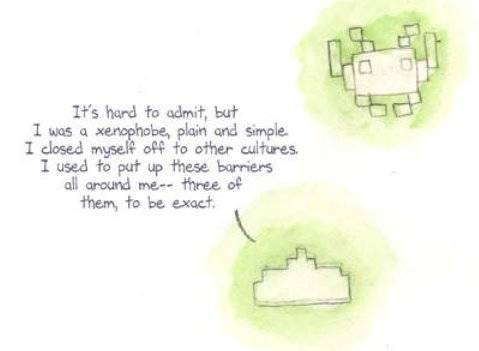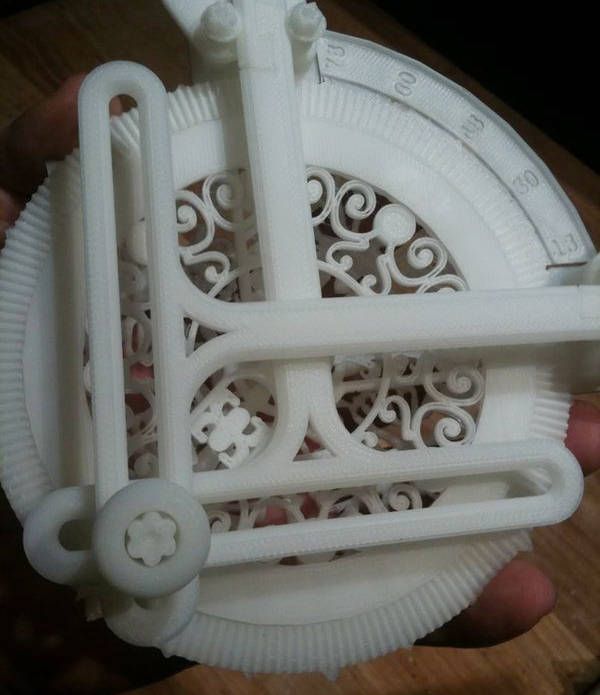The Latest from Boing Boing |  |
- Legends of the Joystick: video game characters remember their youth
- DelayedLock: keep your Android screen from locking immediately
- 3D printed trigonometry calculator
- Japan: massive anti-nuclear protests planned for June 11
- Lightning strikes the Empire State Building (photo: Boing Boing Flickr Pool)
- Marriage tips from Ayn Rand
- Computer glitch snarls US Airways' network, grounding all flights
- Onion-Like Headlines in Real Life
- Mad Libs creator Leonard B. Stern dies at 88
- ACLU sues US to declassify cables already published by Wikileaks
- A quote that went well with an earlier BoingBoing post
- Alaska releases more than 24,000 printed pages of Sarah Palin's emails
- It's sneaky
- Company sues Apple over iCloud trademark
- How to stay cool without an air conditioner
- "Wikiwars," CNN documentary on Wikileaks, debuts
- Very bad late '90s hip-hop cover art
- Final Space Shuttle launch will be first to carry iPhones into space
- All hail the Great Hamster of Alsace
- Thierry "Mr. Brainwash" Guetta loses copyright case with photographer Glen E. Friedman
- Meet Michael Saltino, South African song sensation
- Gay Pride flash mob
- Tracking the source of an E. coli outbreak
- Apple moves to halt Lodsys lawsuits
- Alleged Sony PSN hackers arrested
| Legends of the Joystick: video game characters remember their youth Posted: 11 Jun 2011 03:18 AM PDT  Legends of the Joystick is a short original comic about video game characters > remembering the days of their youth written by Gene Yang and drawn by Thien Pham, the duo who produced Level Up, the fantastic graphic novel about filial piety, video game obsession, and the American immigrant experience that also came out this week. |
| DelayedLock: keep your Android screen from locking immediately Posted: 11 Jun 2011 02:47 AM PDT DelayedLock is a useful Android app that prevents your device from locking up for a minute or two after you switch it off. I often turn off the handset when following map directions, but it's a pain in the ass to unlock it a few seconds later to figure out which turn goes next. (via Lifehacker) |
| 3D printed trigonometry calculator Posted: 11 Jun 2011 02:41 AM PDT  Lalbritton's "Ideal Harmonic Transformer" is a 3D printed mechanism for calculating sines and cosines: " It is a thing to hold, enjoy turning the crank, and look at. If you can't find your calculator, and need to know the sine or cosine of an angle real quick, you can dial in the angle and read off of the Scotch Yokes. It also works in reverse." |
| Japan: massive anti-nuclear protests planned for June 11 Posted: 10 Jun 2011 07:22 PM PDT  Japan's burgeoning anti-nuclear movement will be marking the three month anniversary of the March 11 quake and tsunami with a nationwide day of protests, amidst reports that Japan's nuclear reactors may all be shut down by next April. Organisers are touting the day as a '100-man-nin akushon' (1 million-strong action), and there are nearly a dozen marches happening in Tokyo alone - although whether that's evidence of widespread support, or of a movement that's still hopelessly fragmented, is debatable. The largest demos will centre on Shinjuku, Shibuya and the well-trodden route from Shiba Park to Tokyo Station. Hashtag to follow related activity on Twitter: #611nonukes. Looks like the primary organizing site is nonukes.jp (partial English translation here). They are calling for supporters around the world to organize demonstrations in solidarity: The day marks three months after the Fukushima nuclear disaster triggered by the earthquake and tsunami. The plants are still spewing radioactive materials. No one wants such dirty electricity harmful to human and nature. Join us on June 11th with million-people action throughout the world and let our voice heard. (...) Our solidarity, if you are in Japan, in Asia, in Europe, in Americas, or anywhere in this world, will soon end this dark age of nuclear power generation. |
| Lightning strikes the Empire State Building (photo: Boing Boing Flickr Pool) Posted: 10 Jun 2011 06:45 PM PDT  Photographer and Boing Boing reader Dan Nguyen took this shot, and explains... BOOM! Actually, it didn't sound that impressive. Hope everyone was OK at the Empire State Building. From the 68th floor of the Top of the Rock, during a summer storm. No tripod used, just holding the camera tight to my face and shooting bursts until I got lucky. He wrote a blog post about it here, and has a Flickr set of other shots from the same storm here. Nice capture, Dan! And thanks for sharing it in the Boing Boing Flickr pool. (Image: Lightning strikes the Empire State Building, a Creative Commons Attribution Non-Commercial (2.0) image from zokuga's photostream) |
| Posted: 10 Jun 2011 06:13 PM PDT [Video Link] "Ayn Rand asked her husband to wear a bell on his shoe so she'd know when he entered & left the house" (Via Maude Newton) |
| Computer glitch snarls US Airways' network, grounding all flights Posted: 10 Jun 2011 06:30 PM PDT  Man, the words "airline" and "crash" never mean anything good when they're near each other. Today, the US Airways website crashed and all flights were temporarily grounded after a power outage at one airline's data centers grounded airport and web-based computer systems. US Airways is based in Tempe, Arizona, and the data center was located in Phoenix. More: NYCaviation.com, MSNBC. The problems appear to have started around 430pm ET today based on a cursory Twitter search for the hashtag #USairways. The usairways.com website was also temporarily down. The airline's Twitter account is now frantically retweeting the phrase, "Some airport computer systems are coming back online now and we are working to restore operational order. More on @usairways." At least it wasn't @LulzSec. |
| Onion-Like Headlines in Real Life Posted: 10 Jun 2011 06:05 PM PDT  A Tumblog of Greatness, and my new favorite website: "Onion-Like Headlines in Real Life." |
| Mad Libs creator Leonard B. Stern dies at 88 Posted: 10 Jun 2011 05:44 PM PDT  Mad Libs Around the web: New York Times, Reuters, Washington Post, NPR, Variety, LA Times. Scanned vintage Mad Libs cover from the Flickr stream of Dan Goodsell. A very politically incorrect early page found at this blog, along with a nice collection of other vintage covers. |
| ACLU sues US to declassify cables already published by Wikileaks Posted: 10 Jun 2011 03:19 PM PDT "The American Civil Liberties Union today sued the State Department over its insistence on keeping classified a set of diplomatic cables describing the government's efforts abroad to avoid attention or accountability over its actions connected to the 'War on Terror,' despite the fact that the documents have already been released by WikiLeaks." (aclu.org) |
| A quote that went well with an earlier BoingBoing post Posted: 10 Jun 2011 03:21 PM PDT Indifference towards people and the reality in which they live is actually the one and only cardinal sin in design. — Dieter Rams. *ahem* (Via Maria Popova) |
| Alaska releases more than 24,000 printed pages of Sarah Palin's emails Posted: 10 Jun 2011 05:52 PM PDT  Officials in the state of Alaska today released about 13,000 of Sarah Palin's emails from the former governor's first 21 months in office. During that period, her fame grew and she became a GOP vice presidential nominee. In the video below, you can see 24,199 pages of those emails boxed up and hand-carted on dollies (note that the boxes show they're printed on "Cougar" brand paper, heh). The process of preparing the documents for release took some two years, involved 55 current and former state employees, and required a legal review that concluded on May 31. Ms. Palin used a Yahoo email account, rather than an official Alaska government email account, presumably to avoid state archiving and recordkeeping requirements.
Among the 14,482 emails that were sent or received by then-Gov. Sarah Palin (R), Alaska officials released just over 11,000 without altering them. But they also redacted some information from more than 2,300. And they held back 953 entirely. The content may not all be heavy (we are talking about Sarah Palin here), but the documents are. And unlike Palin, they're not cheap. From the New York Times: [H]er old e-mails are being released by the pound, not the pixel, in six boxes, a total of about 250 pounds at a printing cost of $725 per set.Reading these early news accounts, it's not yet clear to me why the state chose to release the emails in printed form, as opposed to scanned images or in some native text-based digital form with full headers and such. Some interesting issues around forensics and privacy to consider there. But releasing these state documents on paper, and charging for them, makes the task all the more onerous for reporters and investigators. Of course, the state could have been even more cruel: selecting a font like, say, Comic Sans. Or Zapf Dingbats. So why are we seeing them at all? Because Mother Jones, ProPublica, and MSNBC requested them in 2008.
What's most interesting to me about this story is the way it resembles reactions to Wikileaks dumps. Take, for instance, the Washington Post's approach: a main site devoted to the big picture here, and a request to readers to help crowdsource. And they've even set up a Twitter feed dedicated to the story here, @PalinEmails, with "micro-updates."
And yes, she really did request that a tanning bed be installed in the governor's office. (PHOTO: Former Alaska Governor Sarah Palin (R) greets a protester holding a sign reading "Idiot Queen" as she arrives for a clambake at a private residence in Seabrook, New Hampshire June 2, 2011. REUTERS/Brian Snyder) |
| Posted: 10 Jun 2011 02:48 PM PDT |
| Company sues Apple over iCloud trademark Posted: 10 Jun 2011 03:13 PM PDT  A company named iCloud Communications has sued Apple over its use of the name "iCloud." iCloud offers similar cloud computing services to those announced by Apple: online storage, accessible from any computer connected to the internet. Though its services are angled more toward business customers than consumers, it says it's been in the business since 2005. In its complaint, iCloud charts Apple's history of trademark tangles—Apple has fought with The Beatles' Apple Corps., and high-end audio hardware maker McIntosh, to name but two—as evidence that it is a willful infringer. It says that the media attention given to Apple means the mark has already become associated with the new offering, announced earlier this week, rather than iCloud Communications' established business. Apple filed trademarks for iCloud on June 1, according to the U.S. Patents and Trademark Office. In its lawsuit, filed in U.S. District Court in Arizona, iCloud Communications claims a "long and extensive use of the iCloud marks," but does not identify a registered trademark that has been infringed. When contacted at iCloud's published number, a man answering the phone said that he could not comment on its legal action. When asked if iCloud had ever registered a trademark for the term, the man, who did not give his name, said "We may have. We may not." It is not required to register trademarks, but failing to do so limits its legal options in court. According the the USPTO's online records, there are only two other filings with the iCloud name, other than Apple's. One trademark registration was awarded in 2008 to Xcerion Corp, which recently sold the iCloud.com domain to Apple. The other registration for an iCloud trademark was filed May 6 this year by Douglas Dane Baker, of North Carolina, covering similarly defined services. It is not clear what goods or services Mr. Baker has made available. iCloud's legal complaint [Scribd via The Next Web] A company named iCloud Communications has sued Apple over its use of the name "iCloud." iCloud offers similar cloud computing services to those announced by Apple: online storage, accessible from any computer connected to the internet. Though its services are angled more toward business customers than consumers, it says it's been in the business since 2005. In its complaint, iCloud charts Apple's history of trademark tangles—Apple has fought with The Beatles' Apple Corps., and high-end audio hardware maker McIntosh, to name but two—as evidence that it is a willful infringer. It says that the media attention given to Apple means the mark has already become associated with the new offering, announced earlier this week, rather than iCloud Communications' established business. Apple filed trademarks for iCloud on June 1, according to the U.S. Patents and Trademark Office. In its lawsuit, filed in U.S. District Court in Arizona, iCloud Communications claims a "long and extensive use of the iCloud marks," but does not identify a registered trademark that has been infringed. When contacted at iCloud's published number, a man answering the phone said that he could not comment on its legal action. When asked if iCloud had ever registered a trademark for the term, the man, who did not give his name, said "We may have. We may not." It is not required to register trademarks, but failing to do so limits its legal options in court. According the the USPTO's online records, there are only two other filings with the iCloud name, other than Apple's. One trademark registration was awarded in 2008 to Xcerion Corp, which recently sold the iCloud.com domain to Apple. The other registration for an iCloud trademark was filed May 6 this year by Douglas Dane Baker, of North Carolina, covering similarly defined services. It is not clear what goods or services Mr. Baker has made available. iCloud's legal complaint [Scribd via The Next Web] |
| How to stay cool without an air conditioner Posted: 10 Jun 2011 02:40 PM PDT I don't really like air conditioners. I didn't grow up with them. And I find them overly cold and unpleasant the vast majority of the time. To me, that all adds up to mean Not Worth The Energy They Suck Down. Usually, there are a couple of days in August that are hot enough for me to give in and turn on a window unit overnight. I know, I know. It's Minnesota. Ain't no thing. But I didn't use them in Kansas, either, which is orders of magnitude more uncomfortable in Summer. When I lived in Alabama, they made more sense. But my husband and I still went one Summer (of the two we lived there) a/c-free. I bring this up because I have a theory. I think "I don't use air conditioning" could become the new "I don't use soap." Now, personally, I adapt by living in a house that holds its temperature pretty well—so a very hot day in June is still comfy inside, while a hot day in August is not. I also open the house overnight and use fans to suck in cool air. Then, at dawn, I close all the windows, draw the blinds, and only use fans to circulate what's inside. Christopher Mims has a different method. His involves a fan and a damp, synthetic cooling towel:
|
| "Wikiwars," CNN documentary on Wikileaks, debuts Posted: 10 Jun 2011 02:34 PM PDT  This weekend, CNN will air "Wikiwars," the network's much-promoted documentary on Wikileaks hosted by a former Navy SEAL. The one-hour program premieres Sunday, June 12, 8:00pm ET & PT, and will repeat at other times after that. This weekend, CNN will air "Wikiwars," the network's much-promoted documentary on Wikileaks hosted by a former Navy SEAL. The one-hour program premieres Sunday, June 12, 8:00pm ET & PT, and will repeat at other times after that.I haven't seen it yet, but Greg Mitchell, who has been blogging tirelessly about Wikileaks over at the Nation for nearly half a year now, has. The short version: "Like [the PBS] Frontline epic," he says, the CNN documentary contains "no new news."
This is a list of Assange / WikiLeaks critics interviewed (and quoted more than once): David Leigh, Nick Davies, Daniel Domscheit-Berg, Adrian Lamo, Brigadier Gen. Mark T. Kimmitt (Ret.). Here is a list of Assange / WikiLeaks supporters interviewed: one unnamed and masked allegedly activist from Anonymous. Other critics who get face time: Hillary Clinton, Robert Gates, even Newt Gingrich. Not a surprise: The official Wikileaks Twitter account, presumably Julian Assange himself, describes the documentary as "full of the usual slanders."
|
| Very bad late '90s hip-hop cover art Posted: 10 Jun 2011 02:15 PM PDT  An academic appreciation of very bad late '90s Hip-Hop cover art. (thanks, David) |
| Final Space Shuttle launch will be first to carry iPhones into space Posted: 10 Jun 2011 02:15 PM PDT Astronauts on the final mission of the Space Shuttle program (STS-135, scheduled for launch in July) will be taking iPhones into space for the first time. They're not taking the devices up there in search of better reception, though—this is all about experimenting with apps. (Cosmic Log) |
| All hail the Great Hamster of Alsace Posted: 10 Jun 2011 02:04 PM PDT There's a legitimate news story buried in here, but all I get out of it is that there is a creature called The Great Hamster of Alsace. If that's not a great thing to build an organized religion around, I'll eat this swell pope hat I just made. |
| Thierry "Mr. Brainwash" Guetta loses copyright case with photographer Glen E. Friedman Posted: 10 Jun 2011 02:17 PM PDT  (Above Left: Photo of Run D.M.C. Sean Bonner broke the initial news of the legal dispute here on Boing Boing, in a guest blog post this January. From the Melrose and Fairfax art blog: A judge just ruled against Mr. Brainwash in a lawsuit from photographer Glen E. Friedman claiming that MBW used his iconic photo of Run D.M.C. The Hollywood Reporter has the full story, and covered earlier news of the dispute here. More at the UK Guardian, and Thomas Hawk's photography blog, and at photoattorney.com. Some will ask how this case is different from that of the Associated Press and Shepard Fairey, over Fairey's iconic Obama poster. Some context: Fairey is a creative collaborator and friend of Friedman, and Bonner, and crossed paths with Guetta, as those of you who saw "Gift Shop" will recall. Sean Bonner covered that question here in detail, in a previous Boing Boing guest blog post.
|
| Meet Michael Saltino, South African song sensation Posted: 10 Jun 2011 12:13 PM PDT [Video Link]. The "quiet storm" of Zef. (thanks, Griffin, via WatKykJy) |
| Posted: 10 Jun 2011 03:22 PM PDT  Maddy Landi (left of center, dreadlocks) and dance company kNOTDance formed a flash mob Friday in Pittsburgh's Market Square, in support of Pittsburgh Pride 2011. After five minutes of choreographed dancing and acrobatics, the team melted back into the crowd. After the jump, video! Photo: Heather Beschizza. Maddy Landi (left of center, dreadlocks) and dance company kNOTDance formed a flash mob Friday in Pittsburgh's Market Square, in support of Pittsburgh Pride 2011. After five minutes of choreographed dancing and acrobatics, the team melted back into the crowd. After the jump, video! Photo: Heather Beschizza. |
| Tracking the source of an E. coli outbreak Posted: 10 Jun 2011 09:30 AM PDT  Europe is currently in the grip of a deadly outbreak of Escherichia coli O104:H4—a rare strain of a common bacterium. Prior to last month, E. coli O104:H4 had only been identified as a cause of illness in one, single person. As of yesterday, the bacteria had sickened thousands and killed 27. E. coli is a gut bacteria. There are E. coli living in your intestines right now. The good news is that those strains aren't dangerous. Instead, when people get sick from E. coli, it's usually the work of strains that live in the guts of animals, especially cows. These bugs, while as friendly to their bovine hosts as our E. coli are to us, release chemicals that are toxic to people. When we consume them—by getting meat juices on fresh vegetables or fruit, via manure sprayed on crops, or through contaminated water supplies—the foreign E. coli can make us very, very sick. And that sickness is difficult to treat. That's because some strains, including O104:H4, actually release more toxins when you try to fight them with antibiotics. The European Center for Disease Prevention and Control has linked most of these recent cases back to the northern part of Germany, the victims either live there or had recently traveled through the region. So it's reasonable to assume that the contaminated food either came from there, or was eaten there. But that's the easy part. It's much, much harder to figure out what, exactly, it was that made people sick. Over the weekend, authorities thought they'd pinpointed the outbreak to a bad batch of organic salad sprouts. But, when preliminary tests of the sprouts turned up no evidence of contamination, they backed off and started pointing the finger at imported cucumbers and tomatoes from Spain. Today, the official opinion flip-flopped again. Direct tests of the sprouts are still turning up negative. But epidemiological studies show that people who ate the sprouts were 9 times more likely to become infected than those who had not. That's enough evidence to affect the immediate public health response—shut down the farm, warn people off sprouts. But it's not necessarily going to be the final word on where this outbreak came from. Top image: A graph showing examples of a bacterial growth mediums including a few of Escherichia coli (E.coli) bacterias displayed in a microbiological laboratory at the Bulgarian Food Safety Agency in Sofia June 9, 2011. The European Union on Wednesday upped compensation to 210 million euros from 150 million for farmers hit by plummeting sales, after Germany first blamed cucumbers from Spain and other salad vegetables, and then German bean sprouts. (REUTERS/Stoyan Nenov)
In fact, outbreaks of food-borne illness, in general, are tricky to pin down. Just think about the way you eat—lots of different foods, from different stores, coming from different places ... even different countries. You don't know where it came from. And you probably don't even have the best recall of what you specifically did and didn't eat over the course of the past week. That's important, because investigations of food-borne illness start with interviews. Epidemiologists compare the foods that sick people reported eating and compare them to the ones that healthy people ate. Any dish that shows up more frequently among the sick becomes a suspect. But then scientists still have to narrow down the ingredients. It's a slow investigation, and an imperfect one that, by its nature, can only happen long after the trails of evidence start to become fuzzy. The United States Centers for Disease Control explains how scientists can be mislead:
As a result, it's not particularly unusual for investigations of food-borne illness to get the culprit wrong, or point to a couple of possible culprits and then later narrow it down after the outbreak has ended. It's also not surprising to statistically pinpoint a veggie villain that never actually tests positive for E. coli. In 2006, for instance, an American E. coli outbreak was traced to Taco Bell, but the specific vegetable involved was at first misidentified. The statistical investigation pointed to green onions, then later to shredded lettuce. But no food samples ever turned up positive for the strain of E. coli that made people sick. That's because the entire supply—even the entire supply from the same supplier—doesn't have to be contaminated for people to get sick. And scientists can't test every single green onion or, in this case, every single sprout. This week, Reuters sent photographers into labs across Europe to see how that sampling and testing is done. In this series of photographs, you can follow along as whole sprouts are turned into liquified samples, and the samples are tested to see whether E. coli is present. The shots don't all come from the same places, but this will give you a good idea of what the process looks like. (All caption text by Reuters, not me.) An Austrian scientist selects cress sprouts in the microbiological laboratory of the The Austrian Agency for Health and Food Safety (AGES) in Vienna June 9 , 2011. The German government has been criticised at home and around Europe for failing so far to pin down the cause of the E.coli outbreak that has killed 27 and stricken more than 2,700 people in 12 countries. All cases have been traced back to near Hamburg in northern Germany. (REUTERS/Leonhard Foeger)
|
| Apple moves to halt Lodsys lawsuits Posted: 10 Jun 2011 09:45 AM PDT Apple moved to stop patent troll Lodsys' legal shakedown of iOS developers, filing a motion to intervene in the proceedings, writes Florian Mueller: "While I don't have any confirmation from anyone that Apple has agreed to cover those defendants' costs and potential risks, it's hard to imagine how else this could work." |
| Alleged Sony PSN hackers arrested Posted: 10 Jun 2011 06:07 AM PDT David Jolly and Raphael Minder write in the NYT: "The Spanish police said Friday that they had arrested three suspected computer hackers in connection with recent cyberattacks on Sony's PlayStation network as well as corporate and government Web sites around the world." |
| You are subscribed to email updates from Boing Boing To stop receiving these emails, you may unsubscribe now. | Email delivery powered by Google |
| Google Inc., 20 West Kinzie, Chicago IL USA 60610 | |







No comments:
Post a Comment